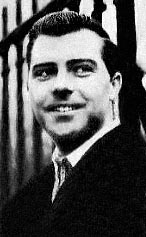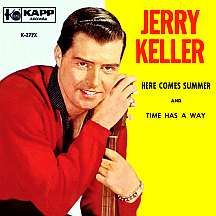JERRY KELLER
Here Comes Summer
1958's summer season had more hit songs celebrating its existence than any other year that decade. The music industry had zeroed in on those millions of teenage radio listeners with three months of free time on their hands. The Danleers' "One Summer Night" ('...I held you tight') kicked things off. "Let's Go Steady For the Summer" by The Three G's played up the warm weather romance angle ('...we'll go strollin' in the moonlight'), while The Jamies' "Summertime, Summertime" encouraged partying ('...it's time to live and have some thrills!') and "Lazy Summer Night" by The Four Preps claimed passions peaked around the halfway mark ('...romance runs high the last two weeks in July'). Then Eddie Cochran's "Summertime Blues" job protest ('...I'm-a gonna raise a fuss, I'm-a gonna raise a holler!') became the biggest hit of the bunch. After another academic term had flown by, 1959's post-schoolyear stretch seemed much quieter, but an easygoing anthem emerged when newcomer Jerry Keller stated the obvious: "Here Comes Summer."
Fort Smith, Arkansas native Keller lived in Tulsa, Oklahoma from age six and sang with several vocal groups prior to graduation from Will Rogers High School in 1955. He hosted a local radio show for a short time and sang with Anita Bryant a few years prior to her close-but-no-cigar '59 Miss America bid. After a couple of visits to New York City, he moved there for good and began working with a vocal coach. At church services he met Pat Boone (close to graduating from Columbia University, even after having achieved superstar status as a singer), who introduced him to his manager, Marty Mills (the son of famous music publisher Jack Mills). Jerry penned all four sides of his first two 1958 pop singles: "Please Sing To Me" on the Web label (the backing group called themselves The Wig Twisters) and "A Wandering Stranger" on Jubilee.
Mills got him in the door at Kapp Records and another pop song, "Time Has a Way," an early Noel Sherman-Barry Mann offering, was slated for his debut. A throwaway tune (at least in label boss Jack Kapp's opinion) was Keller's clever "Here Comes Summer," thrown together at the end of the session and placed on the single's B side (insurance should the timely subject matter catch on at the time of its late-spring '59 release). Juvenile ditties were not Kapp's cup of tea (he would change his mind a year later when a certain song about an "Itsy Bitsy Bikini" sold scads), but Jerry's lyrics nailed the "class dismissed" mindset ('School's not so bad, but summer's better...') while carrying on the romantic themes of the previous summer's crop ('...it gives me more time to see my girl...when we kiss it makes my flattop curl!') with a bonus hook calculated to make everyone...relax a little? "My Old Kentucky Home," Stephen Foster's Americana piece from 106 years earlier (and thus in the public domain) provided the tune for the line 'Oh let the sun shine bright on my happy summer home," a comforting subliminal throwback that couldn't have hurt the song's chances. It reached the top 20 in August, the biggest "summer" seller of the year. The Brits bought into it with even more gusto, though vacation time had come and gone by October, when "Here Comes Summer" hit number one in the U.K.
Miffed, perhaps, that such teen tripe seemed to be replacing the good ol' pop standards, Jack Kapp exercised poor judgment by released the album Here Comes Jerry Keller, a collection of ballads, without including the midtempo hit that might have prevented it from hitting the bargain bins so quickly. Sid Tepper and Roy C. Bennett's "If I Had a Girl" was the fall follow-up, a near-carbon copy of Rod Lauren's version for RCA Victor that wound up in the top 40 (like Jerry, Rod soon had his own difficulties trying to avoid the "one-hit" void). Jerry didn't get a chance to compose any more A sides and his four remaining singles on Kapp came off in varying shades of schmaltz. He toured England in 1960 and was well-received by fans, then the draft board welcomed him into the ranks of the Army; while on leave in '61 he made some recordings for Capitol ("Be Careful How You Drive Young Joey" - "teenage tragedy" averted!) and signed with Coral Records after his discharge. He and Richard Coleman recycled ideas from the '59 hit and "Some Summer" resulted; they went so far as to sneak in the title and melody of Ren Shields and George Evans' "In the Good Old Summer Time," a newer standard (just 61 years old as of summer 1963)!

It appeared the only way Jerry might land a second hit was to write one...but not attempt to sing it! "Almost There," composed with Gloria Shayne of "Goodbye Cruel World" fame, was a minor hit for Andy Williams in late 1964. He and Gloria penned "The Legend of Shenandoah," a spoken word recording by James Stewart (the star of the '65 film Shenandoah), at about the same time Jerry fashioned the score for murder-horror-thriller I Saw What You Did starring Joan Crawford. He added lyrics to David Blume's jazz composition "Turn-Down Day" and N.Y.-based band The Cyrkle made it a summer '66 hit, placing Keller's name in the fine print of the pop chart's top 20...again, at long last! This led to another jazz-related project, composing lyrics for Francis Lai and Pierre Barouh's theme from the Oscar-nominated A Man and a Woman (too bad it missed getting nominated in the Best Original Song category...what a comeback that would have been!); flutist Herbie Mann and vocalist Tamiko Jones had the most successful version. Blume and Keller continued writing together and had a low-hanging chart single in '67 with "Foolin' Around" by Chris Montez.
Jerry made occasional records (for Reprise, RCA Victor and Warner Bros.) and wrote another film score (1969's Angel in My Pocket with former Mayberry sheriff Andy Griffith). In the 1970s he sang commercial jingles for Pepsi-Cola and other products and did some acting (in a pair of soapy late-'70s movies directed by Joe Brooks, You Light Up My Life and If Ever I See You Again). Meanwhile his ode to every kid's favorite time of year was remade by The Dave Clark Five in 1970; Nashville pop-rockers Wildfire (actually Jack "Stack-A-Track" Grochmal and DJ Scott Shannon) placed it on the U.S. charts in 1977. "Here Comes Summer" is the main thing Jerry Keller is remembered for, particularly during the time of year when the weather starts getting warmer.


